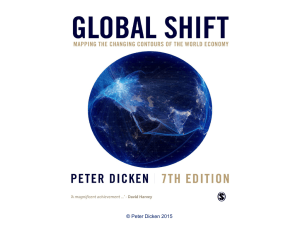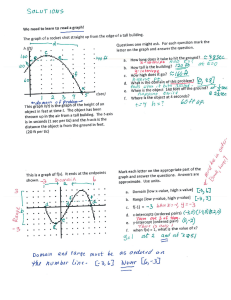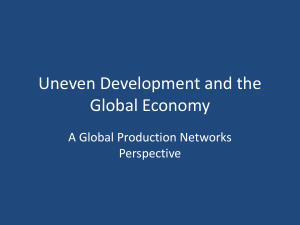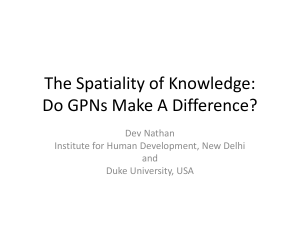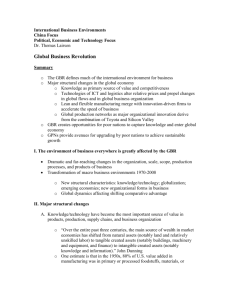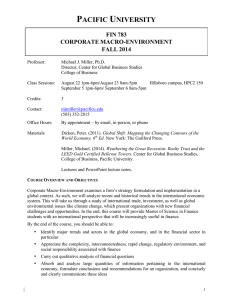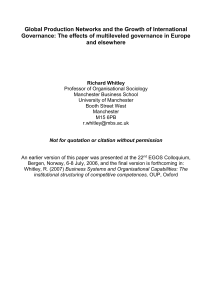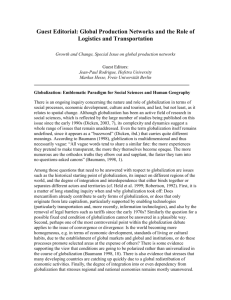POLICY EUROPEAN How the European Union Can
advertisement
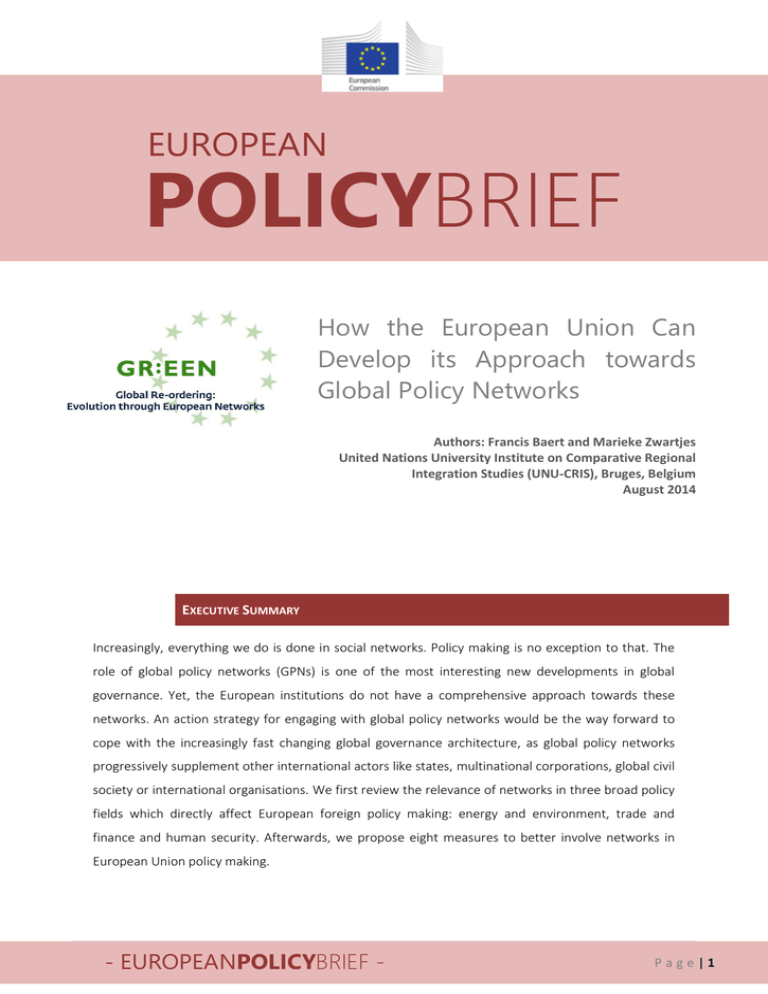
EUROPEAN POLICYBRIEF How the European Union Can Develop its Approach towards Global Policy Networks Authors: Francis Baert and Marieke Zwartjes United Nations University Institute on Comparative Regional Integration Studies (UNU-CRIS), Bruges, Belgium August 2014 EXECUTIVE SUMMARY Increasingly, everything we do is done in social networks. Policy making is no exception to that. The role of global policy networks (GPNs) is one of the most interesting new developments in global governance. Yet, the European institutions do not have a comprehensive approach towards these networks. An action strategy for engaging with global policy networks would be the way forward to cope with the increasingly fast changing global governance architecture, as global policy networks progressively supplement other international actors like states, multinational corporations, global civil society or international organisations. We first review the relevance of networks in three broad policy fields which directly affect European foreign policy making: energy and environment, trade and finance and human security. Afterwards, we propose eight measures to better involve networks in European Union policy making. - EUROPEANPOLICYBRIEF - Page|1 INTRODUCTION More and more, policy making involves networks. The role of global policy networks (GPNs) is one of the most interesting new developments in global governance. GPNs supplement other international actors like states, corporations or international organisations by pursuing global agenda-setting, developing standards and coordinating knowledge dissemination. The members of the GR:EEN1 consortium have studied this topic in depth. The focus of this consortium is on the development of GPNs as global actors and on the implications of this for EU foreign policy making. GR:EEN executed a foresight study2 to know more about GPNs and European policy making in particular. This policy brief is based on the findings of that study. It aims to confirm that the results of the exercise are relevant to the development of the EU’s strategy to become a more relevant world player and an effective supporter of multilateralism in a multi-polar international system. Networks vary substantially in terms of composition, function, financing and role. Our definition3 of networks includes, first, transnational advocacy networks consisting of non-governmental organisations and activists such as the Human Security Network (HSN). Secondly, business-related networks such as the European Round Table of Industrialists (ERT) or the Transatlantic Business Dialogue (TABD). Thirdly, transnational executive networks where government officials play a central role, see for instance the Basel Committee on Banking Supervision. Fourthly, global public policy networks, to which the Global Water Partnership for instance belongs, that include members from government as well as private actors and civil society. Finally, knowledge networks and epistemic communities which give scholarly argumentation and scientific justification for evidence-based policy formulation. An example of an epistemic community is the Committee of Permanent Representatives (Coreper) which is based at the Council of the EU. It is challenging to formulate general statements because of the substantial differences between GPNs. Nevertheless, our study shows that officials from different European institutions consider GPNs important actors in connecting and influencing policy processes at different levels (local, regional and global). The connecting and influencing between networks and the EU happens at different stages of the policy making process, e.g. agenda-setting, dialogue, implementation and evaluation. A well1 GR:EEN stands for ‘Global Re-ordering: Evolution through European Networks’. In a first stage, almost 50 experts evaluated GPNs in a Policy Delphi exercise. Based on these findings, a smaller group of selected experts developed strategic management scenarios related to GPNs and the European institutions. This workshop delivered a series of scenarios and also provided insight in the complex intertwined effects of goals and measures that the EU may implement. 3 Diane Stone, “The New Networks of Knowledge: Think Tanks and the Transnationalization of Governance,” Policy Studies Journal 36, no. 1 (2008): 19-38. 2 - EUROPEANPOLICYBRIEF - Page|2 functioning system of GPNs, consistent with EU values, would be in the interest of the EU. Indeed, if the EU wants to augment its contribution and relevance in global policy processes it should reflect on its role in shaping the new global governance architectures, including its approach to engaging with GPNs. NETWORKS AND THE EU In general, the EU aims to have an optimal functioning of GPNs because the EU promotes better governance, a more democratic approach and a more participatory approach. However, not all networks are supported by the EU. In each policy area there are specific interests at stake and the EU wants to support those networks that support EU policies best. The Union has an online transparency register where private actors, companies, think tanks and nongovernmental organisations (NGOs) are asked to declare what network they are members of. This is useful but of self-declaratory nature. Energy and Environment In energy and environment, the EU has engaged in various initiatives and partnerships that – at various degrees – reach out to global networks or initiatives. This includes projects under the Intelligent Energy Europe umbrella, public hearings and expert networks. Other important initiatives4 in these domains are: Renewable Energy Policy Network for the 21st Century (REN21), Renewable Energy & Energy Efficiency Partnership (REEEP), Global Network on Energy for Sustainable Development (GNESD), EU Energy Initiative for Poverty Eradication and Sustainable Development (EUEI), Global Climate Change Alliance (GCCA), Intergovernmental Panel on Climate Change (IPCC), Climate Action Network (CAN), REDD+ Community, European Environmental Communication Networks, European Network of the Heads of Environment Protection Agencies (EPA Network) and European Network of Environmental Professionals (ENEP). In the environmental domain, networks have been playing a significant role, for instance in the context of multilateral climate negotiations. Because a global climate regime is not taking shape, policy networks, initiatives and groups pushing for various elements of the low carbon cause are crucial. As the transnational networks operate on all governance levels (local, regional and global), they have an advantage over established, multilateral regimes. 4 This list and the following lists of networks are not exhaustive. - EUROPEANPOLICYBRIEF - Page|3 The EU should become more pro-active towards policy networks. Networks are able to mobilise expertise, contribute to implementation and foster agendas. In these cases, there still is room for more in-depth and complementary efforts between the EU and policy networks. Trade and Finance In current EU politics, business-related networks or transnational executive networks such as the European Round Table of Industrialists (ERT) or the Transatlantic Business Dialogue (TABD) with strong pro-Transatlantic Trade and Investment Partnership (TTIP) advocacy orientation are dominating. Influential networks in finance include: Basel Committee on Banking Supervision (BIS), International Organization of Securities Committees (IOSCO), International Swaps and Derivatives Associations (ISDA), Group of Thirty, Financial Stability Board, International Association of Insurance Supervisors (IAIS), Tax Justice Network, Financial Action Task Force (FATF), Alternative Investment Management Association (AIMA) and International Auditing and Assurance Standards Board (IAASB). In trade, we can think of Corporate Europe Observatory, International Chamber of Commerce (ICC), World Economic Forum, Foreign Trade Association, Washington International Trade Association (WITA), The Evian Group, and finally, industry-specific networks such as the Biotechnology Industry Organization (BIO). In trade, the influence of the different types of networks varies across issues, in different phases and in different ways. An example of GPNs’ influence is the TTIP, which grew out of the Transatlantic Business Dialogue. Transnational advocacy networks have changed the TTIP debate in Europe after its launch in 2013. These networks also managed to bring down the Anti-Counterfeiting Trade Agreement (ACTA). In finance, the importance of aforementioned GPNs is undisputed. As a rule of thumb, the relations between the EU and these networks are cooperative. Human Security Traditional security still mainly falls under the rubric of national sovereignty, which makes it more difficult for the EU to engage in this field. Yet, much has changed in the last decade with developments in the build-up of a European Security and Defence Policy (ESDP). In traditional security, the main actors are still states and international organisations, although this is also changing dramatically in two ways. First, more activist networks around people-centred human security are getting increasingly important. Second, security is the perfect field to show that we should not be too naïve about networks either. In our mapping of different networks we only included ‘positive’ networks which influence policy-making in a constructive manner but we should not forget that ‘bad - EUROPEANPOLICYBRIEF - Page|4 networks’ also exist: networks of terrorists, criminal networks including drugs, goods and human traffickers and smugglers, etc. But these bad networks were not the focus of our research. Significant networks in the field of human security are the Human Security Report Project and The Civil Society Network for Human Security. Transnational advocacy networks are especially active in this field. We find them in fields that are traditional topics for human rights advocacy. Big human rights NGOs like Human Rights Watch, Handicap International, the International Committee of the Red Cross or Amnesty International which are networks of their own play a significant role but so do issue-specific networks like the International Campaign to Ban Landmines (ICBL), the Cluster Munition Coalition (CMC), the International Coalition to Ban Uranium Weapons, or advocacy groups around newer topics like drones or killer robots. With regard to the latter, we can refer to the Campaign to Stop Killer Robots. The value of security related networks lies in the consistency and integrity of the research agenda. Unlike policy and diplomatic roles, networks in the domain of security help to provide continuity, development and visibility to a concept or approach no matter who is in power politically. In sum, GPNs are influential at the European level depending on the issue area, but on the other hand, their potential seems not to have been entirely exploited. ROADMAP Together with the participants of the GR:EEN foresight exercise5, we have identified eight measures for the EU to implement. These measures should ideally be realised in the order below to engender the best result for EU policy making. 1. Consider the case to create a GPN Knowledge Network which would function as hub for EU activities This measure ensures knowledge creation and sharing about GPNs. This might be a costly activity but nevertheless seems to be a good starting point in order to obtain a high result at the end. Even though real life policy making does not start from an imaginary situation with any previous existing history, knowledge or experience, it is worthwhile to ensure qualitative knowledge management in order to optimise policy actions. 5 These measures have been discussed during the strategic management workshop which was attended by officials of different European institutions. - EUROPEANPOLICYBRIEF - Page|5 2. Take stock of on-going GPN activities This stocktaking exercise should happen within the different EU institutions. The exercise should identify the on-going engagement of the EU with GPNs, such as an evaluation of membership, financial contribution and the impact of GPN activities on EU policy making. 3. Consider GPNs as an alternative to regulation e.g. standard-setting, implementation, etc. Even though this measure has a high impact on policy making, it is considered important by EU officials. 4. Identify key GPNs and engage more actively with them It is important to create venues and platforms where the EU can engage with GPNs and meaningful partnerships between GPNs can be stimulated. This allows expertise to be effectively co-opted and made valuable for the EU. European policy makers are already interacting with who they consider to be the key players within key policy networks. This illustrates the need to identify not only the networks, but the key actors within these networks as well. This measure involves an active engagement between the EU and networks. Once this engagement is there, the EU can start coordinating them, cf. the following three measures. 5. Coordinate engagement with GPNs GPN activities and policy output cut across many EU institutions and within EU institutions across departments and Directorate-Generals. A coordinated horizontal approach is necessary. Moreover, many GPNs actively engage or are being supported by the United Nations, International Monetary Fund, World Bank, etc. A more active coordination with other international organisations would support EU global governance initiatives and effective multilateralism. 6. Facilitate new GPNs where they are needed In addition to facilitating new GPNs where needed, it is also key to prevent duplication and disengage networks when appropriate. - EUROPEANPOLICYBRIEF - Page|6 7. Encourage GPNs to adopt the most appropriate balance between advantages of an informal structure with those of a formal organization This measure always follows the previous sixth measure: first you have to facilitate new GPNs before you can encourage them to adopt the most appropriate balance between advantages of an informal structure with those of a formal organisation. 8. Support & enable key GPNs to improve their performance In order to obtain fast results it is wise to support and enable key GPNs to improve their performance. To obtain the best result, this measure is best executed last, after you have consolidated your story and know which GPNs to support. CONCLUSION The foresight exercise has demonstrated that two goals are considered crucial in the way the EU deals with global policy networks: 1. The EU should support the development of a well-functioning system of GPNs consistent with EU values; 2. The EU should utilise the innovation and facilitation roles of GPNs, i.e. the European institutions should make better use of the added value of GPNs, one aspect being its potential problem-solving capacity. This policy brief proposes eight steps to reach these goals. Knowledge about GPNs continues to be crucial at the start to obtain the best result, but an active and coordinated engagement in key GPNs should also be one of the first steps for the different European institutions to take. Subsequently, it is advisable to facilitate new GPNs where necessary and next encourage these and other GPNs to optimise their organisational structure. Supporting and enabling key GPNs to improve their performance should be executed at the very end, after all other measures have been applied. - EUROPEANPOLICYBRIEF - Page|7 PROJECT IDENTITY PROJECT NAME Global Re-ordering: Evolution through European Networks (GR:EEN) COORDINATOR Professor Shaun Breslin, The University of Warwick, Coventry, United Kingdom E: shaun.breslin@warwick.ac.uk CONSORTIUM Universiteit van Amsterdam Amsterdam, Netherlands Boston University Boston, United States of America Université Libre de Bruxelles Brussels, Belgium University of Cape Town Cape Town, South Africa Copenhagen Business School Copenhagen, Denmark Central European University Budapest, Hungary Facultad Latinoamericana de Ciencias Sociales Buenos Aires, Argentina FRIDE Madrid, Spain Istituto per gli Studi di Politica Internationale Milan, Italy Nanyang Technological University Singapore, Singapore Norwegian Institute of International Affairs Oslo, Norway Peking University Beijing, People’s Republic of China United Nations University- Comparative Regional Integration Studies Bruges, Belgium University of Western Australia Perth, Australia Waseda University Tokyo, Japan - EUROPEANPOLICYBRIEF - Page|8 FUNDING SCHEME FP7 Framework Programme, Collaborative Project, SSH – Europe facing a rising multi-polar world DURATION March 2011- February 2015 (48 months) BUDGET EU contribution: 7 944 718 €. WEBSITE www.greenfp7.eu FOR MORE Contact: General queries to green@warwick.ac.uk Contact: Project management matters to Laura Downey, L.Downey@warwick.ac.uk INFORMATION FURTHER READING All working papers, policy briefing papers and other publications are available on our website: www.greenfp7.eu/papers - EUROPEANPOLICYBRIEF - Page|9

